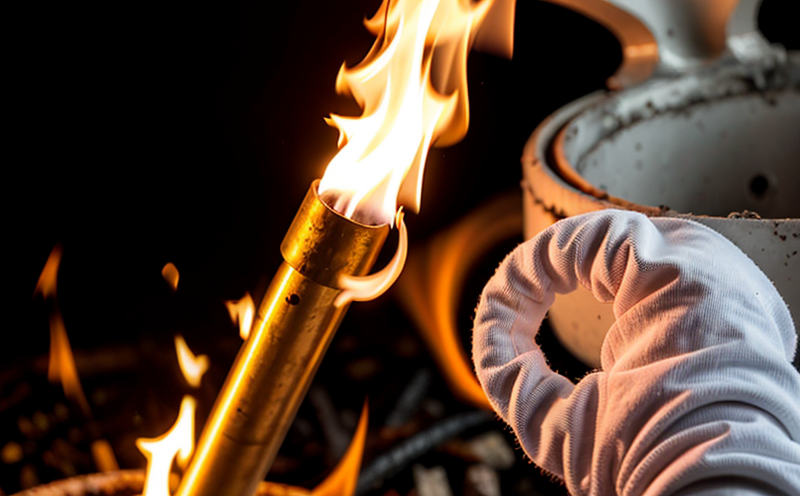EN 11925 Ignitability Testing of Building Products
The European Standard EN 11925:2013 specifies the requirements and methods for ignitability testing of building products. This standard is crucial in ensuring that construction materials do not easily ignite or spread fire, thereby enhancing structural safety and reducing risks to occupants during emergencies. The test aims to assess how a material behaves when exposed to an ignition source, providing valuable data on its resistance to flame spread.
EN 11925 applies specifically to building products that are intended to be used in environments where the risk of fire is significant, such as public buildings, commercial complexes, and residential structures. The standard covers a wide range of materials including insulation boards, ceiling panels, wall cladding, and other similar products.
The testing procedure outlined in EN 11925 involves placing a standardized specimen on a test rig that simulates real-world conditions. A flame source is applied to one end of the specimen, and the behavior of the material during ignition is closely monitored. The standard defines several key parameters for assessment:
- Flame spread rating (FPR): Measures how quickly flames travel along the surface of the material.
- Smoke production: Quantifies the amount of smoke produced by the burning specimen, which can significantly impact visibility during a fire.
- Heat release rate: Indicates the rate at which heat is generated as the material burns. This parameter helps in understanding the potential for rapid spread and intensity of fire.
The test results are used to classify materials into different categories based on their ignitability performance, providing designers and builders with a reliable basis for selecting safe and effective products.
Compliance with EN 11925 is mandatory in many countries, particularly those adhering to European Union regulations. This ensures that construction projects meet strict safety standards, contributing to the overall resilience of infrastructure against fire incidents.
The test methodology described in this standard has been widely adopted and recognized globally for its accuracy and reliability. It is a critical tool for manufacturers aiming to ensure their products are safe and comply with international fire safety regulations.
Benefits
Compliance with EN 11925 offers numerous benefits, both for manufacturers and end-users of building materials:
- Enhanced Safety: Ensures that the products used in construction are inherently less likely to ignite or contribute to fire spread.
- Regulatory Compliance: Meeting this standard helps avoid potential legal issues and penalties associated with non-compliance.
- Better Reputation: Brands that comply with such stringent standards can build a strong reputation for quality and reliability, which is especially important in the competitive construction market.
- Innovation Opportunities: The detailed requirements of EN 11925 encourage manufacturers to innovate by developing safer and more effective fire-resistant products.
The results of ignitability testing are not only valuable for compliance but also serve as a marketing tool, allowing companies to promote their commitment to safety and quality. This can be particularly advantageous in tender processes where stringent safety requirements are specified.
Eurolab Advantages
As a leading provider of testing services for building materials, Eurolab offers several advantages when it comes to conducting EN 11925 ignitability tests:
- Expertise and Experience: Our team comprises highly skilled professionals with extensive experience in fire safety testing.
- State-of-the-Art Facilities: Equipped with advanced test rigs that mimic real-world conditions, our laboratory ensures precise and reliable results.
- Comprehensive Reporting: We provide detailed reports that include all relevant data and analysis, facilitating easier interpretation and decision-making.
- Fast Turnaround Times: Our efficient processes allow for timely completion of tests without compromising on quality.
Additionally, Eurolab’s commitment to customer satisfaction and continuous improvement ensures that our services meet the highest standards. We are dedicated to supporting your compliance efforts and ensuring that your building products meet or exceed international fire safety requirements.
International Acceptance and Recognition
The European Standard EN 11925 is widely recognized and accepted across Europe, but its influence extends beyond regional borders. Many countries around the world have adopted similar standards to ensure that building products are safe and comply with international fire safety regulations.
The test procedures described in this standard have been validated through rigorous scientific research and real-world applications. This has led to a high degree of confidence in the results, making EN 11925 a preferred choice for manufacturers and regulatory bodies alike.
One notable aspect is its compatibility with other international standards such as ISO and ASTM. For instance, the parameters defined in EN 11925 align closely with those specified in ISO 834 and ASTM E648, ensuring consistency across different regions. This alignment facilitates easier trade between countries that have adopted these standards.
The widespread acceptance of EN 11925 also contributes to harmonization efforts within the European Union and other international bodies. By adhering to this standard, manufacturers can ensure their products are accepted in multiple markets without requiring additional testing or certification processes.





